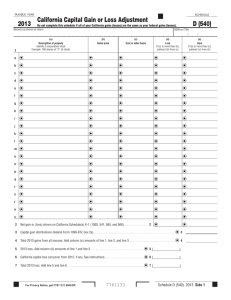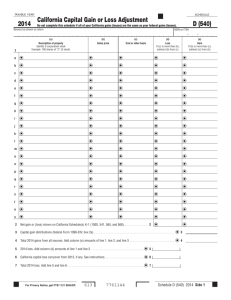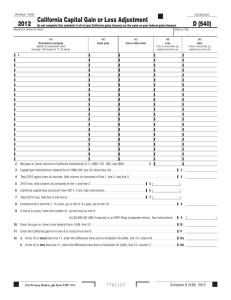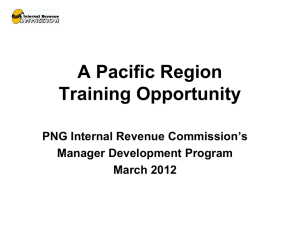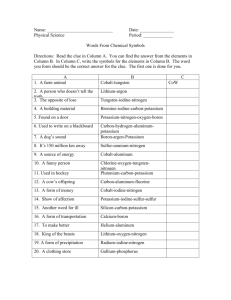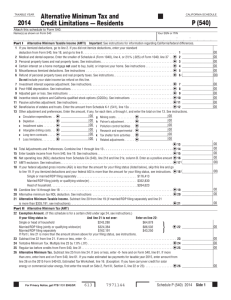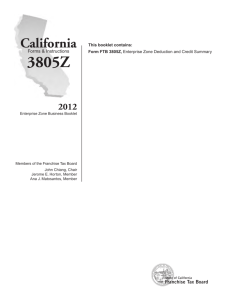2014 Schedule D (541) -
advertisement
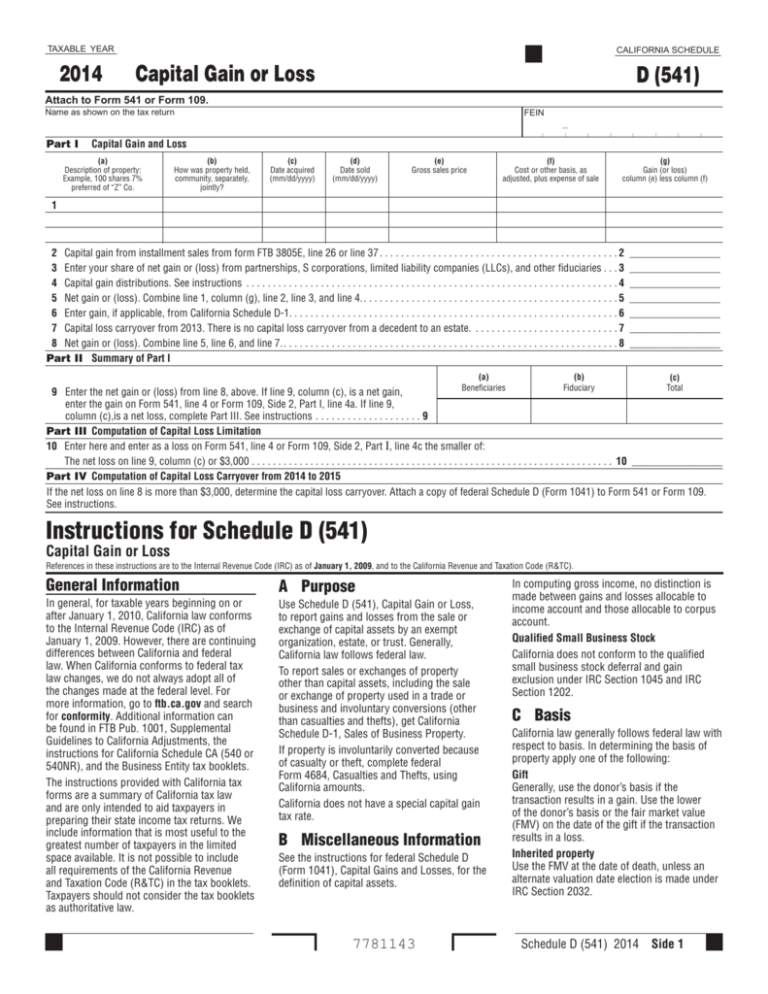
TAXABLE YEAR 2014 CALIFORNIA SCHEDULE Capital Gain or Loss D (541) Attach to Form 541 or Form 109. Name as shown on the tax return FEIN - Part I Capital Gain and Loss (a) Description of property: Example, 100 shares 7% preferred of “Z” Co. 1 (b) (c)(d) (e) (f) How was property held, Date acquired Date sold Gross sales price Cost or other basis, as community, separately, (mm/dd/yyyy) (mm/dd/yyyy) adjusted, plus expense of sale jointly? (g) Gain (or loss) column (e) less column (f) 2 Capital gain from installment sales from form FTB 3805E, line 26 or line 37 . . . . . . . . . . . . . . . . . . . . . . . . . . . . . . . . . . . . . . . . . . . . 2 _________________ 3 Enter your share of net gain or (loss) from partnerships, S corporations, limited liability companies (LLCs), and other fiduciaries . . 3 _________________ 4 Capital gain distributions. See instructions . . . . . . . . . . . . . . . . . . . . . . . . . . . . . . . . . . . . . . . . . . . . . . . . . . . . . . . . . . . . . . . . . . . . . . 4 _________________ 5 Net gain or (loss). Combine line 1, column (g), line 2, line 3, and line 4. . . . . . . . . . . . . . . . . . . . . . . . . . . . . . . . . . . . . . . . . . . . . . . . 5 _________________ 6 Enter gain, if applicable, from California Schedule D-1. . . . . . . . . . . . . . . . . . . . . . . . . . . . . . . . . . . . . . . . . . . . . . . . . . . . . . . . . . . . . 6 _________________ 7 Capital loss carryover from 2013. There is no capital loss carryover from a decedent to an estate. . . . . . . . . . . . . . . . . . . . . . . . . . . . 7 _________________ 8 Net gain or (loss). Combine line 5, line 6, and line 7. . . . . . . . . . . . . . . . . . . . . . . . . . . . . . . . . . . . . . . . . . . . . . . . . . . . . . . . . . . . . . . 8 _________________ Part II Summary of Part I (a) (b) (c) Beneficiaries Fiduciary Total 9 Enter the net gain or (loss) from line 8, above. If line 9, column (c), is a net gain, enter the gain on Form 541, line 4 or Form 109, Side 2, Part I, line 4a. If line 9, column (c),is a net loss, complete Part III. See instructions . . . . . . . . . . . . . . . . . . . . . 9 Part III Computation of Capital Loss Limitation 10 Enter here and enter as a loss on Form 541, line 4 or Form 109, Side 2, Part I, line 4c the smaller of: The net loss on line 9, column (c) or $3,000 . . . . . . . . . . . . . . . . . . . . . . . . . . . . . . . . . . . . . . . . . . . . . . . . . . . . . . . . . . . . . . . . . . . . . 10 _________________ Part IV Computation of Capital Loss Carryover from 2014 to 2015 If the net loss on line 8 is more than $3,000, determine the capital loss carryover. Attach a copy of federal Schedule D (Form 1041) to Form 541 or Form 109. See instructions. Instructions for Schedule D (541) Capital Gain or Loss References in these instructions are to the Internal Revenue Code (IRC) as of January 1, 2009, and to the California Revenue and Taxation Code (R&TC). General Information In general, for taxable years beginning on or after January 1, 2010, California law conforms to the Internal Revenue Code (IRC) as of January 1, 2009. However, there are continuing differences between California and federal law. When California conforms to federal tax law changes, we do not always adopt all of the changes made at the federal level. For more information, go to ftb.ca.gov and search for conformity. Additional information can be found in FTB Pub. 1001, Supplemental Guidelines to California Adjustments, the instructions for California Schedule CA (540 or 540NR), and the Business Entity tax booklets. The instructions provided with California tax forms are a summary of California tax law and are only intended to aid taxpayers in preparing their state income tax returns. We include information that is most useful to the greatest number of taxpayers in the limited space available. It is not possible to include all requirements of the California Revenue and Taxation Code (R&TC) in the tax booklets. Taxpayers should not consider the tax booklets as authoritative law. APurpose Use Schedule D (541), Capital Gain or Loss, to report gains and losses from the sale or exchange of capital assets by an exempt organization, estate, or trust. Generally, ­California law follows federal law. To report sales or exchanges of property other than capital assets, including the sale or exchange of property used in a trade or business and involuntary conversions (other than casualties and thefts), get California Schedule D-1, Sales of Business Property. If property is involuntarily converted because of casualty or theft, complete federal Form 4684, Casualties and Thefts, using ­California amounts. California does not have a special capital gain tax rate. B Miscellaneous Information See the instructions for federal Schedule D (Form 1041), Capital Gains and Losses, for the definition of capital assets. 7781143 In computing gross income, no distinction is made between gains and losses allocable to income account and those allocable to corpus account. Qualified Small Business Stock California does not conform to the qualified small business stock deferral and gain exclusion under IRC Section 1045 and IRC Section 1202. CBasis California law generally follows federal law with respect to basis. In determining the basis of property apply one of the following: Gift Generally, use the donor’s basis if the transaction results in a gain. Use the lower of the donor’s basis or the fair market value (FMV) on the date of the gift if the transaction results in a loss. Inherited property Use the FMV at the date of death, unless an alternate valuation date election is made under IRC Section 2032. Schedule D (541) 2014 Side 1

